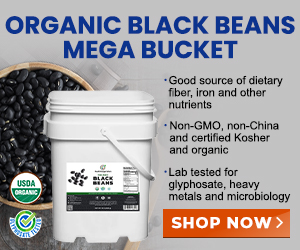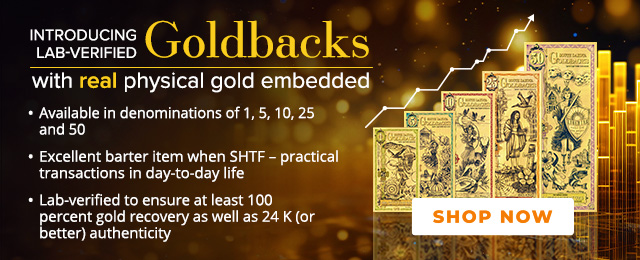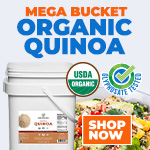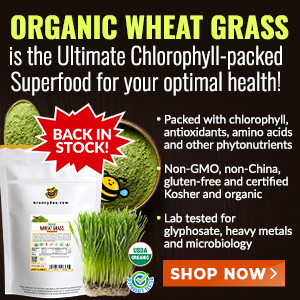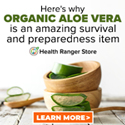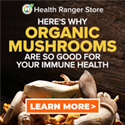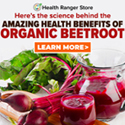
Artificial meat would be a preferable alternative to the cruelty and environmental impact of factory farms
 Thursday, January 18, 2007 Thursday, January 18, 2007by Mike Adams, the Health Ranger Editor of NaturalNews.com (See all articles...) Tags: artificial meat, processed meat, plant-based diet |
- Newly released JFK files reveal Pentagon's role in creating Lyme disease and covid in the same lab
- Dr. Suzanne Humphries makes bombshell appearance on Joe Rogan podcast, exposing vaccine industry deception back to POLIOMYELITIS
- L.A.'s rebuilding nightmare: Only 4 permits issued after fire destroys 6,000 homes
- Discovery of vast underground city beneath Giza pyramids challenges human history
- Black cumin seed oil emerges as a powerful ally against breast cancer and chronic inflammation
- Catastrophic 7.7 earthquake devastates Myanmar and Thailand; death toll could reach 100,000
- AI breakthrough slashes celiac disease diagnosis time from months to minutes
- The hidden battle in your glass: How A1 and A2 milk could shape your health
- Sugar-free deception: Artificial sweeteners hijack hunger signals, fuel obesity epidemic, study warns
- Europe braces for WAR as EU urges citizens to STOCKPILE FOOD, in latest provocations with Russia
- Putin vows to 'finish off' Ukraine, accuses West of prolonging the war
- Thomas Massie’s Dual Loyalty Disclosure Act aims to restore American sovereignty by cracking down on foreign influence in Congress
- Aluminum pollution: A silent threat to human health
- Tesla owners under siege: Road rage, vandalism and political backlash fuel fear among drivers nationwide
- Chaos in Amsterdam: Five injured in broad daylight knife attack near Dam Square
- "Feel G.O.O.D. Gut Health Program" on BrightU: Dr. Basima Williams introduces the Feel-Good Plate Method
- Trump's 25% auto tariffs: A bold move to strengthen U.S. manufacturing despite short-term challenges
- The cancer fear industry: How big pharma profits from panic-and what natural alternatives offer
- Newly released JFK files reveal Pentagon's role in creating Lyme disease and covid in the same lab
- Analysis: The coming economic collapse, a mass uprising and Trump's three secret weapons to halt the growing revolt
- Trump nominates VACCINE ZEALOT Susan Monarez to lead the CDC, sidelining RFK Jr.'s reform efforts
- Trump's greatest betrayal so far: Accelerating Middle East wars, silencing dissent, and serving Zionist masters
- Dr. Mike Yeadon releases 15-minute testimony - WATCH - about genocidal intent of COVID “vaccines”
- Festive flavors: The sweet history, nutritional profile and health benefits of pecan pie
- Elon Musk: Aliens could be here on Earth RIGHT NOW
- Big Pharma's $8 Billion bribery scheme exposed: how doctors are pushed to prescribe junk science, not heal
- 5 Simple steps to boost your brainpower: How to strengthen executive function in a distracted world
- Trump reverses course on Gaza plan, says “nobody is expelling Palestinians”
- A lack of integrity in Academia: Harvard professor found GUILTY of fraudulent research to promote CRT theory
- Reclaim your health: How midlife exercise reverses years of inactivity
- Survival 101: Effective EMF blocking techniques
- Florida takes a stand: DeSantis proposes permanent ban on mRNA vaccine mandates
- Sugarcane extract superior to cholesterol-lowering drugs?
- California's social media censorship law struck down: A victory for free speech or a threat to online safety?
- OpenAI whistleblower who dissented against how the company trained ChatGPT found dead
- EPA advisor admits the agency is funneling billions to climate groups ahead of Trump’s return to White House
- EPA advisor admits the agency is funneling billions to climate groups ahead of Trump’s return to White House
- Newly released JFK files reveal Pentagon's role in creating Lyme disease and covid in the same lab
- California's social media censorship law struck down: A victory for free speech or a threat to online safety?
- Dr. Mike Yeadon releases 15-minute testimony - WATCH - about genocidal intent of COVID “vaccines”
- The Health Ranger releases “Vaccine Zombie” song and music video, using AI-animated zombies for the music video
- The pandemic as a tool for INDOCTRINATION: Understanding “The Indoctrinated Brain” by Dr. Michael Nehls
- Florida takes a stand: DeSantis proposes permanent ban on mRNA vaccine mandates
- “Why we influenced the 2020 elections”: Facebook files reveal the coordinated effort to bury the Hunter Biden laptop story
- Mike Adams releases country western hit single: Goin’ Back in Time is Comin’ Home
- Mike Adams releases music poetry sensation: A Child of God
- Unpacking the Lies That We’ve Been Fed – new song and music video released by Mike Adams, the Health Ranger
- Michigan sheriff announces criminal investigation into 2020 election crimes, Dominion Voting Systems
- Migrants are taking advantage of recent hurricanes to scam residents and loot their homes
- House Intelligence Committee calls for the ARREST and PROSECUTION of Dr. Anthony Fauci
- RFK Jr. clears key hurdle: Sen. Susan Collins backs controversial HHS nominee, signaling a new era for health policy
- Rep. Nancy Mace introduces bill to ban biological males from female facilities on federal property
- Peter Rost exposes Big Pharma corruption in his book “The Whistleblower: Confessions of a Healthcare Hitman”
- Mike Adams releases new song and music video: Nothing More Disgusting Than a Globalist
- Red Cross issues warning to stop blood plasma donations from vaccinated people
- Scientists confirm: GENIUS brain function can be spontaneously unleashed in humans without any apparent cause
- EPA advisor admits the agency is funneling billions to climate groups ahead of Trump’s return to White House
- HYSSOP: What research reveals about the health benefits of this ancient holy herb
- Two containers with completed ballots fall out of truck in Florida
- Fully vaccinated about to see “tsunami” of illness and death, warns virologist
- Global leaders unite to clamp down on “misinformation” with UN-backed Cascais Declaration
- BREAKING: 2025 NDAA authorizes mandatory military draft of WOMEN across America… as Pentagon pursues global NUCLEAR war with both Russia and China at the same time
- Michael Yon warns of a ZIONIST TAKEOVER in Trump’s second administration
- BOMBSHELL: DNA testing kits are a SCAM to develop ethnic-specific bioweapons
- Ozempic and Wegovy weight loss drugs are injectable LIZARD VENOM PEPTIDES that may unleash a devastating wave of organ failure… side effects align with symptoms of SNAKE BITES
- Israeli soldiers accused of even more torture and abuse in the West Bank
- These 13 countries just signed an agreement to engineer a global FAMINE by destroying food supply
- NASA admits that climate change occurs because of changes in Earth’s solar orbit, and NOT because of SUVs and fossil fuels
- RFK Jr. clears key hurdle: Sen. Susan Collins backs controversial HHS nominee, signaling a new era for health policy
- Sermon 30: How Jesus reveals Caesar’s FAKE CURRENCY and FALSE AUTHORITY
- Coriander seeds: Ancient medicine backed by modern science
- Arizona officials claim Maricopa County needs 10-13 days to tabulate results of the election
First of all, let me state that my diet currently consists of very little meat. I don't believe in eating animals for their flesh. I don't believe in raising animals and slaughtering them just because their muscle tissue is something I want to consume casually at a Friday barbecue. I think it's highly unethical to treat animals as life-support systems for meat, which is really the way most people look at a cow -- it's just there to support the growth of the meat. There's no consideration whatsoever for the experience of the cow which is, of course, a living, breathing being with a consciousness. Cows have memory, emotions and even their own family members. I don't think it is appropriate in any advanced civilization to be raising and slaughtering animals to consume their meat. It's a rather barbaric practice.
That's one reason why I support the artificial meat idea, because if we can create meat and make it available to consumers without having to kill animals in the process, then we are in fact doing far less harm to the world. We're causing less suffering. We are not putting these animals through the experience of being enslaved in a system with the sole purpose of turning their body into a food source and, ultimately, a profit source. Let's face it -- that's what cattle ranching and pig farming and chicken farming is today. It's a system of exploiting the lives of these animals in order to make a profit. So if artificial meat can replace that, that's an important benefit. Let consumers eat meat without having to kill animals.
Health implications of artificial meat
The second reason I am strongly in support of artificial meat is because I believe that this artificial meat will actually be healthier for people than commercially grown and produced meat, because commercially produced meat comes from cows that are subjected to an assault of various chemicals. They are injected with antibiotics and hormones; they are fed grain that's been sprayed with pesticides and sometimes grown in soils laced with heavy metals. There are Polychlorinated Biphenyls, rocket fuel, and all kinds of other contaminants found in the fat cells of animals that have been raised for food.So, if you take a cow, pig or chicken and you look at the way it's treated in a commercial ranching or farming environment, you'll find that it's a very unhealthy food source, because it has consumed and concentrated all of these toxic chemicals. When a human being consumes that meat, those toxic chemicals are ingested into that human's body, where they function as cancer-causing chemicals, liver-damaging or hormone-disrupting chemicals. By utilizing artificial meat you can consume meat that, even though it's synthetic and based on chemicals, at least won't have the concentration of heavy metals, pesticides, antibiotics and all these other terrible chemicals that cows are forced to consume.
Artificial meat could end up being healthier for people than real meat. Before you think I've gone crazy, let me explain a little further. No meat, in my opinion, is actually healthy if consumed in large quantities. There are a number of reasons for that, including the fact that meat has no fiber. It putrefies in the digestive tract and is strongly correlated with the onset of pancreatic cancer, breast cancer, colon cancer and bladder cancer. We know meat isn't good for you in the quantities consumed by Americans today. I'm not saying that artificial meat will be good for you, either, but it won't be as bad for you as commercially raised meat.
The other point here is that there is such a thing as healthy, live meat from free-range animals. If you take an animal from a natural environment, fed raw plants, raw grasses, live foods, without it being subjected to antibiotics and hormones or inhumane methods of slaughter, that meat will be much healthier for you than traditionally raised beef. Still, there's no denying that this is a terrible experience for the animal. The animal is still being killed and eaten. This is not the kind of experience that any of us would wish to endure, and yet we require this of other animals so that we may feed ourselves in a mindless way the foods that we prefer to consume.
To summarize, the least healthy meat of all is commercially raised meat -- non-organic, non-free range, factory meat products. Healthier than that would be of course free-range meat, kosher-certified meat, and along the lines of similar health would be artificial meat. None of these meats, as I have stated, are in fact good for you if consumed in large quantities. I believe that meat is not necessary for the human diet, except perhaps in the case of pregnant women who need extra iron and protein. In that case, the meat serves as a very high density protein and iron source that cannot be replicated from the plant world (iron from plants is molecularly different than iron from meats). But with prenatal nutrition, it's doubly important to have organic, free-range meat that's not contaminated with pesticides and heavy metals.
Meat consumption harms the planet
There are tremendous implications resulting from the mass consumption of meat products by the American population, such as the fact that it takes 10 times as much land to create meat protein as it does similar quantities of protein from vegetables. We're also seeing the clear-cutting of rain forests, in the Amazon especially, in order to create grazing land for cattle.The decision to eat meat is not a solely personal decision. It doesn't just affect you. It actually affects the planet. The more meat you consume, the more land is used for meat raising and harvesting. In the case of the Amazon rainforest, it means there's less land available to support natural rain forest habitat, which is, of course, important for the oxygen production of the entire planet. So, in a very understandable way, the mass consumption of red meat around this planet actually affects the climate of the planet. Global climate change is one side effects of massive meat consumption.
If we were to switch over to a system of generating artificial meat, then the climate effect of this meat production would be drastically reduced. There still may be some industrial runoff or some kind of post-production chemicals that need to be dealt with after creating artificial meat, but undoubtedly these would be far less harmful to the planet than the clear-cutting of rain forest, injecting cows with hormones and antibiotics and raising crops with pesticides so that cows can be fed in a very inefficient food production system.
So artificial meat, even though it may sound strange, could actually be better for the planet if people continue to consume meat. Now what would be best for the planet -- and actually best for the health of individuals, families and entire nations -- would be of course to move away from a meat-centered diet. If we could get people to eat half the meat they currently consume, we would see far lower rates of heart disease, all varieties of cancers, and less obesity as well. Even though the long-term solution is to move to a plant-based diet, as a civilization, a short-term solution could include artificial meat.
Many benefits from a plant-based diet
I have probably eaten more than my share of meat for my entire life already. When I was growing up, my grandfather was a cattle rancher, so we got all the free meat we ever wanted and I ate meat constantly. I have now mostly given up meat (and red meat entirely), but I don't believe in aggressively pushing vegetarianism onto others. I simply have arrived at the obvious conclusion that there's nothing better for the human body, mind and spirit than food based on plants.If you eat nothing but a plant-based diet, you will be far healthier than if you were to introduce any amount of meat into your diet. All the information out there about people having nutritional deficiencies on a vegetarian diet is misguided and flat-out wrong. Unless, of course, for people are living on what I call a "junk food vegetarian diet," which is soda, chips and vegetarian processed food. Of course that diet causes nutritional deficiencies. But not a health-minded vegetarian diet. Even vitamin B12 is simple to get in sufficient quantities if you put your mind to it.
As a society, we can exist quite comfortably on a plant-based diet. We can get everything we need in terms of nutrition -- including essential oils, vitamins, minerals and the like -- on a plant-based diet. We do not need meat to survive as a civilization. In fact, I believe that the mass consumption of meat devolves our society, because it makes us more angry and aggressive. It makes us less humane and is an uncivilized way to use the resources of the planet to support the human population, whereas consuming and surviving on plants is an evolved and intelligent way to feed the planet. If you consume mostly raw foods, then you also get outstanding nutrition. Cooking food destroys much of its nutritional content -- not only the proteins, but also the vitamins and the phytonutrients that make plants such a potent nutrition source in the first place.
If you can avoid cooking some of these foods, and subsist at least partially on a live foods diet -- as I have been doing now for some time -- you find that you need a lot less food, get much better nutrition, and don't really need any meat. That includes even very active lifestyles like my own, which involve strength training, Pilates, lots of running, martial arts and cycling.
The bottom line is that I am a cautious supporter of this idea of artificial meat production because of the practicalities involved. People will continue to consume meat on the planet for the time being. If that is the case, then I believe that we are much better off having people consume artificial meat than tearing the flesh from living, breathing beings and calling that dinner. Artificial meat has my vote even though, personally, I would never touch it with a fork. I support it only because it is a practical alternative to meat taken from live animals.
###
Artificial meat at FETCH.news
Get independent news alerts on natural cures, food lab tests, cannabis medicine, science, robotics, drones, privacy and more.
 About the author:Mike Adams (aka the "Health Ranger") is a best selling author (#1 best selling science book on Amazon.com) and a globally recognized scientific researcher in clean foods. He serves as the founding editor of NaturalNews.com and the lab science director of an internationally accredited (ISO 17025) analytical laboratory known as CWC Labs. There, he was awarded a Certificate of Excellence for achieving extremely high accuracy in the analysis of toxic elements in unknown water samples using ICP-MS instrumentation. Adams is also highly proficient in running liquid chromatography, ion chromatography and mass spectrometry time-of-flight analytical instrumentation.
About the author:Mike Adams (aka the "Health Ranger") is a best selling author (#1 best selling science book on Amazon.com) and a globally recognized scientific researcher in clean foods. He serves as the founding editor of NaturalNews.com and the lab science director of an internationally accredited (ISO 17025) analytical laboratory known as CWC Labs. There, he was awarded a Certificate of Excellence for achieving extremely high accuracy in the analysis of toxic elements in unknown water samples using ICP-MS instrumentation. Adams is also highly proficient in running liquid chromatography, ion chromatography and mass spectrometry time-of-flight analytical instrumentation.
Adams is a person of color whose ancestors include Africans and Native American Indians. He's also of Native American heritage, which he credits as inspiring his "Health Ranger" passion for protecting life and nature against the destruction caused by chemicals, heavy metals and other forms of pollution.
Adams is the founder and publisher of the open source science journal Natural Science Journal, the author of numerous peer-reviewed science papers published by the journal, and the author of the world's first book that published ICP-MS heavy metals analysis results for foods, dietary supplements, pet food, spices and fast food. The book is entitled Food Forensics and is published by BenBella Books.
In his laboratory research, Adams has made numerous food safety breakthroughs such as revealing rice protein products imported from Asia to be contaminated with toxic heavy metals like lead, cadmium and tungsten. Adams was the first food science researcher to document high levels of tungsten in superfoods. He also discovered over 11 ppm lead in imported mangosteen powder, and led an industry-wide voluntary agreement to limit heavy metals in rice protein products.
In addition to his lab work, Adams is also the (non-paid) executive director of the non-profit Consumer Wellness Center (CWC), an organization that redirects 100% of its donations receipts to grant programs that teach children and women how to grow their own food or vastly improve their nutrition. Through the non-profit CWC, Adams also launched Nutrition Rescue, a program that donates essential vitamins to people in need. Click here to see some of the CWC success stories.
With a background in science and software technology, Adams is the original founder of the email newsletter technology company known as Arial Software. Using his technical experience combined with his love for natural health, Adams developed and deployed the content management system currently driving NaturalNews.com. He also engineered the high-level statistical algorithms that power SCIENCE.naturalnews.com, a massive research resource featuring over 10 million scientific studies.
Adams is well known for his incredibly popular consumer activism video blowing the lid on fake blueberries used throughout the food supply. He has also exposed "strange fibers" found in Chicken McNuggets, fake academic credentials of so-called health "gurus," dangerous "detox" products imported as battery acid and sold for oral consumption, fake acai berry scams, the California raw milk raids, the vaccine research fraud revealed by industry whistleblowers and many other topics.
Adams has also helped defend the rights of home gardeners and protect the medical freedom rights of parents. Adams is widely recognized to have made a remarkable global impact on issues like GMOs, vaccines, nutrition therapies, human consciousness.
In addition to his activism, Adams is an accomplished musician who has released over a dozen popular songs covering a variety of activism topics.
Click here to read a more detailed bio on Mike Adams, the Health Ranger, at HealthRanger.com.
Take Action: Support Natural News by linking to this article from your website
Permalink to this article:
Embed article link: (copy HTML code below):
Reprinting this article:
Non-commercial use OK, cite NaturalNews.com with clickable link.
Follow Natural News on Facebook, Twitter, Google Plus, and Pinterest
Science News & Studies
Medicine News and Information
Food News & Studies
Health News & Studies
Herbs News & Information
Pollution News & Studies
Cancer News & Studies
Climate News & Studies
Survival News & Information
Gear News & Information
News covering technology, stocks, hackers, and more



"Big Tech and mainstream media are constantly trying to silence the independent voices that dare to bring you the truth about toxic food ingredients, dangerous medications and the failed, fraudulent science of the profit-driven medical establishment.
Email is one of the best ways to make sure you stay informed, without the censorship of the tech giants (Google, Apple, Facebook, Twitter, YouTube, etc.). Stay informed and you'll even likely learn information that may help save your own life."
–The Health Ranger, Mike Adams











